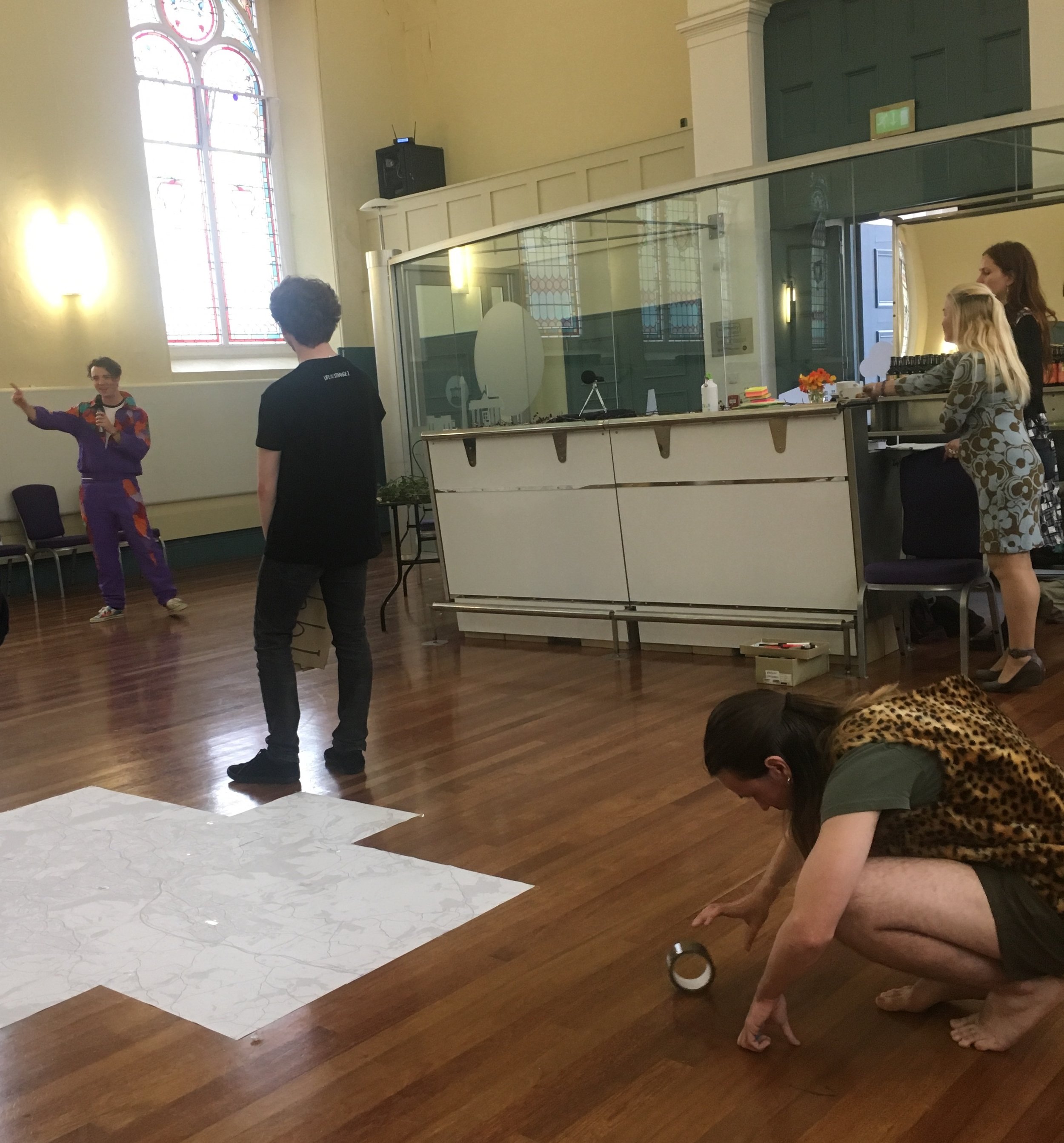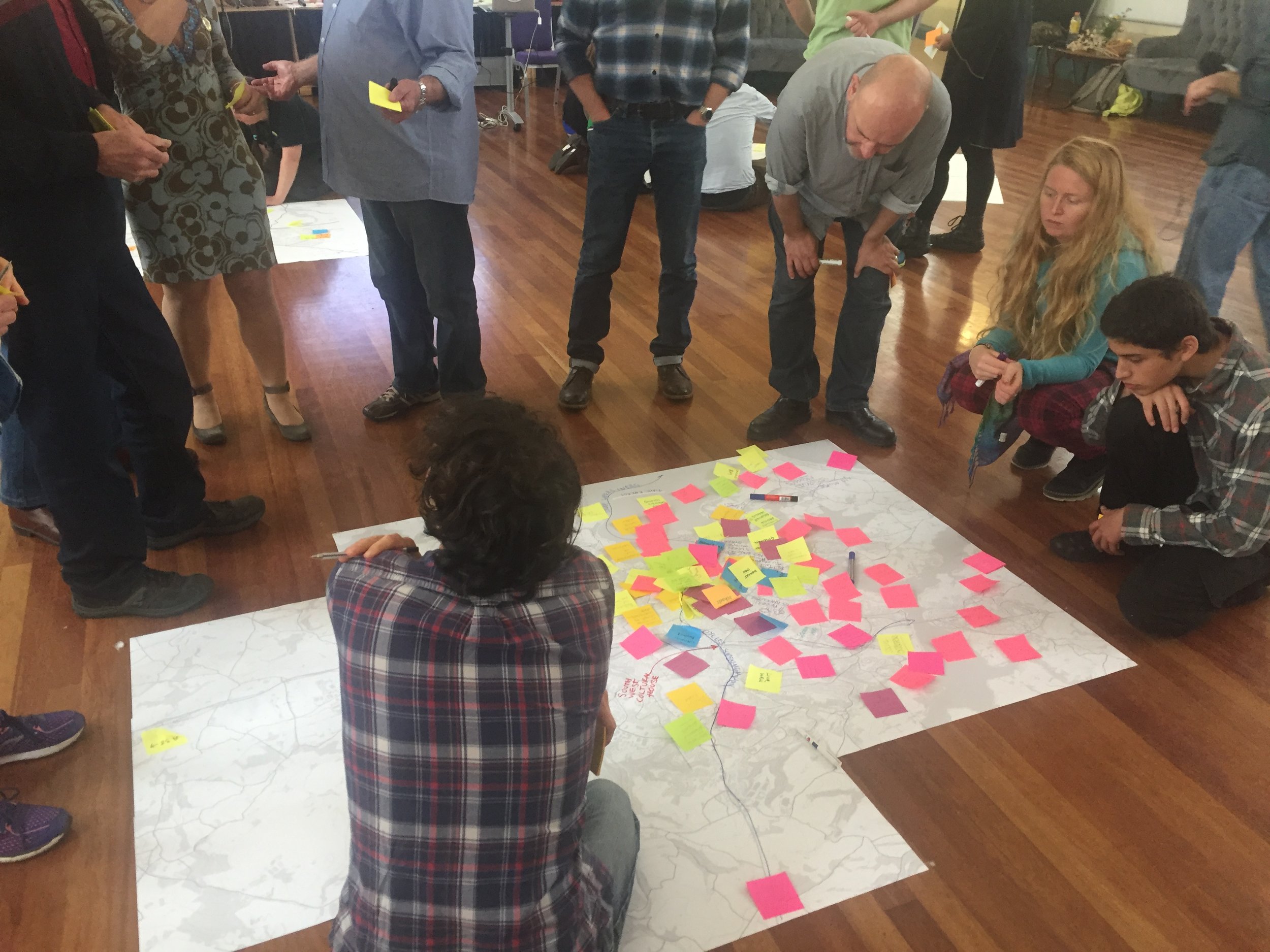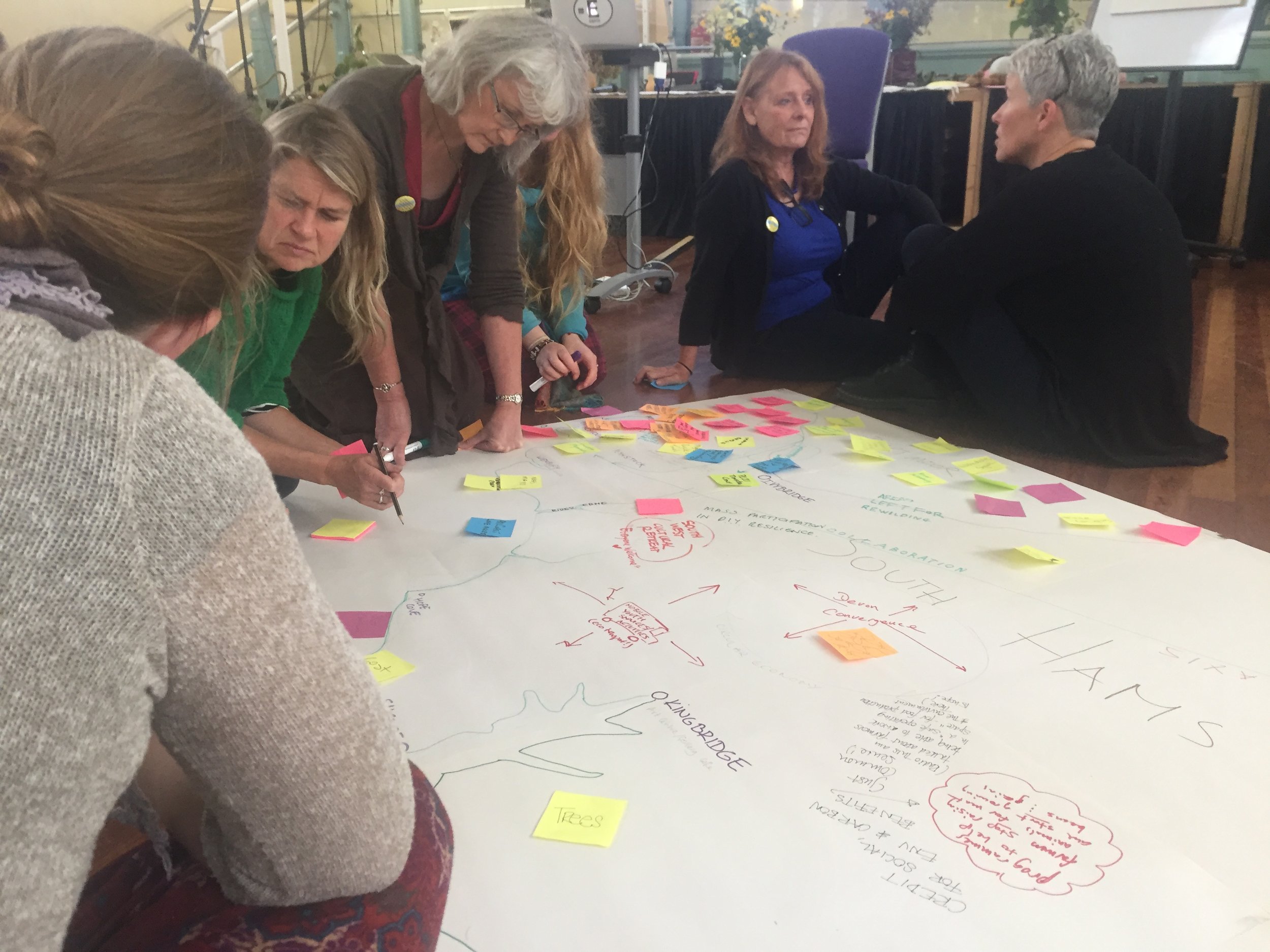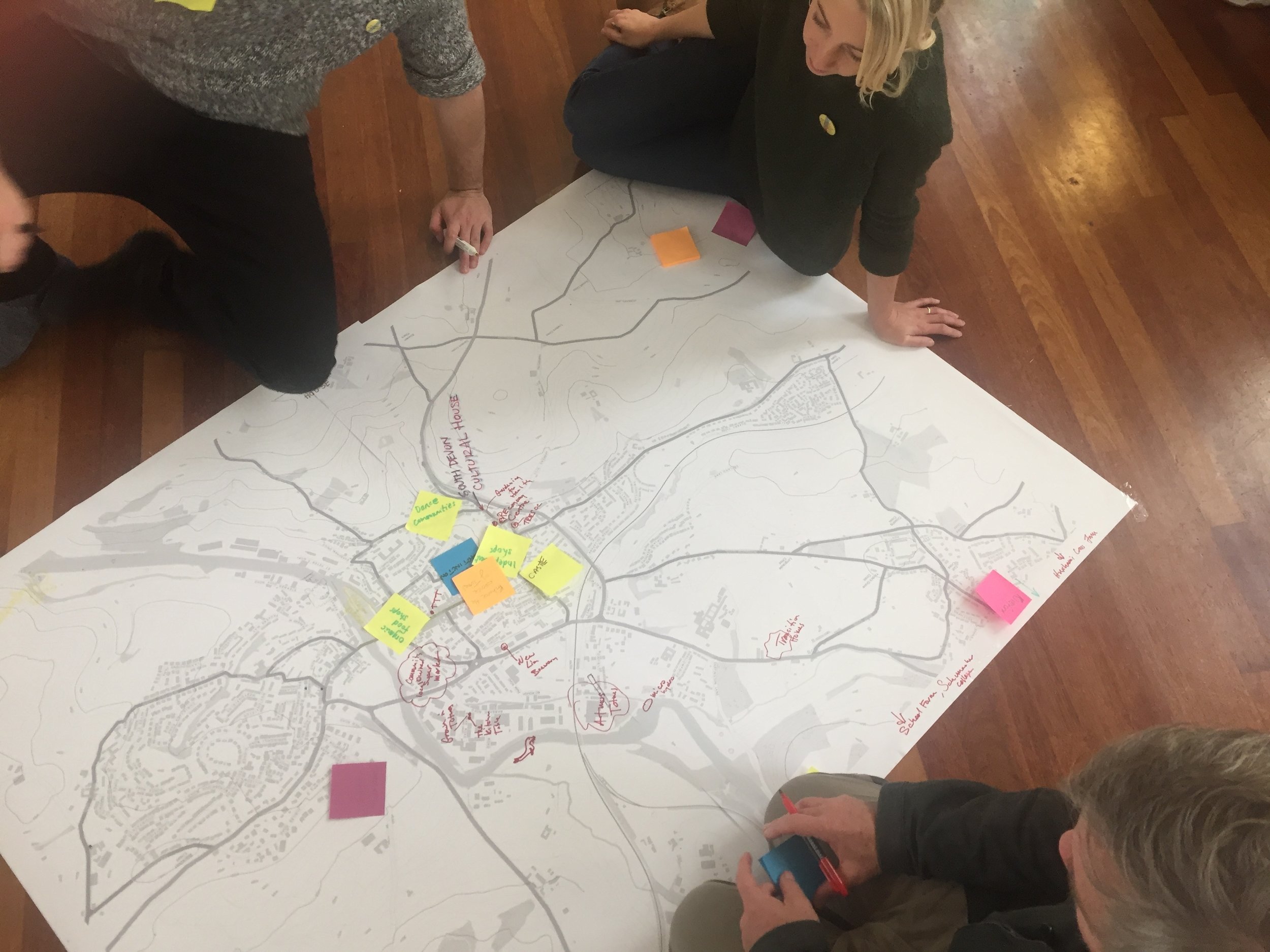Editorial: Here is the feeling of a collaboratory (Plymouth, 13th Oct, 2018)
A slightly different format for our editorial this week - which is essentially an instant report on the “Inquiry” stage of our collaboratory process, with the communities of South Devon and Plymouth. However, the rich experience of the day allows our co-initiator, Pat Kane, to occasionally dwell on how the event - strongly shaped and designed by Plymouth actors - develops and enriches our ideas about localism, autonomy and creativity.
This Saturday, we conducted “the Inquiry” - the second stage of our “collaboratory” process taking place in Devonport Guildhall, which sits at the core of Plymouth, which itself is the leading city of South Devon. Our first “Friendly” in June had catalysed a strong group of people. And this weekend - plus some new friends - they came back to join the Alternative UK’s process of reinventing citizenship and reimagining politics, through a celebration (and joining-up) of local power.
Our intent with our collaboratory process is to create an original space, within which people can rebuild a new kind of citizenship. This is a space which maintains a distance from the dualistic, tribal routines of British party politics. Into that distance we bring the richness and complexity of modern 21st century life - the myriad of ways in which we make a mark on, and a difference to, the world and others.
And we make this material the centre of how we think about our powers, our resources and what we can build together. All of which we could call “politics”—if the word weren’t so tainted by recent official practice.
If our intuitions and theories are right, when we open up these spaces it should allow for new alliances between local actors, for new structures of feeling and action to develop.
What is exciting about Plymouth and South Devon is that it’s perfectly obvious that there is a very strong tradition of people creating these spaces for themselves. And that anything we might enable is an amplification, or an excuse to make new fusions and networks possible.
Our main partner this time was the Real Ideas Organisation, RIO, a social enterprise platform who sees its explicit gig as supporting a culture of initiative-making in the city and its wider region. The day was part of a wider UK celebration called Social Saturday - in which the vast, below-the-radar and locally-based multitude of social enterprises trumpeted their value to the wider society.
(We shared the Guildhall on Saturday with a new brewery, whose “Free Beer” brand (made by local brewers Billy Ruffian’s, from an open source recipe provided by the Swedish art group Superflex) got everyone raving the end of our day).
So our space on Saturday opened up in a context which would already be super-friendly to “alternatives”. In the weeks and months prior, we had been working with a group of artists, activists and facilitators, most of whom had attended our first “Friendly”.
And they had made a strong claim, in recent weeks, to shape the “Inquiry” event in their own way. We had agreed that the overall emphasis should be about building ambition about the future of South Devon and Plymouth - and that this should happen through different levels of facilitation, performance, mapping of ideas and personal testimony.
But as the Alternative UK, we walked up to the Guildhall not quite knowing what to expect from the day. Which, in terms of our ambition to generate new “citizens networks” to express local autonomy and creativity, is exactly the process we want to be happening.
Our day began with a young Ecuadoran spoken word artist, named Or (see this blog for the text of his startling performance). Then we assembled a circle where people brought their iconic object from this area, and spoke to it personally. After that, some guided physical interactions among the entire group (about 40 people at the start of the event).
To start this process in such a “soft” way is a more important process than we generally realise. One of the ways a new politics can develop is from humans who, when the political moment begins, are bodily and emotionally resonant; they feel free, easy and delighted with themselves and others. This is so different from the rows of chairs, top-table speakers and hands-raising of the traditional meeting form.
What actions will seem possible and do-able, if you’re in a happy and liberated personal state? Yet our team also set out clearly-spoken ground rules: we were to follow values of respect, openness, honesty, safety, and honouring everyone’s voice.
The first ideas generation was called a “lily pad” exercise. One on side of an oval, we were invited to write about things that made us happy, angry, want to change, and be hopeful about Plymouth: on the other side, we’d write the key word that arose from those questions.
Then, with the keyword up, our pads were laid around the floor of the hall. The music started, and we were asked to wander round them, taking in the content. Then, like musical chairs, the song stopped, and we were invited to speak to the “future” of the keyword before us. The experience was gentle, but expansive. Standing before “local bakery”, or “time”, or “automation tax”, it was easy to fill 30 seconds with your imaginings.
Caveman and Y2K consultant in “Fog Machine”
Lunch was had, and then broken into by an immersive drama performance, “Fog Machine” (see picture, left). Three characters from the human (and maybe inhuman) record, rising up from the deep past to a misty future, performed a range of our emotional responses to transforming progress. A caveman was over-enthusiastic about his fire and wheel discoveries; a 1999-era huckster warned about the Y2K bug, and was slowly consumed by his own virus; and in the high-balcony, a 30th century goddess quoted the perennial wisdom of that cosmic guru, Micheal Jackson: “if you want to make the world a better place, you gotta look at yourself and make that change”.
Suitably expanded and entertained, we then were guided to massive maps now covering the floor. These were ordinance survey prints of Plymouth, Totnes, Ivybridge, Saltash, and the whole “South Hams” region (which is most of South Devon). The aim here was to move participants from their personal zone (“I”), towards the realms of “We” and “The World” that we share.
We were asked to identify places we valued in these areas (with post-its), and then to signify what we thought a future in 12 years (2030) might be for each of these areas.
(The collaboratory team will spend quite a few days going over these multi-layered texts, identifying patterns of valued places and the near-future aspirations for them. We’ll report back of them in a form where they can be developed and built on by the co-creators that composed them.)
A/UK co-initiator Pat Kane (in his role as occasional futurist) did a brief presentation which began to take the roof off our future speculations. He placed these rich maps of Plymouth and South Devon possibility in the context of radical technological innovation over the next 50 years and beyond.
Robots and software may take over physical and mental routine from humans - but can that liberate us into our inimtable human qualities, like play, care, love, if we can be bold about the power structures which could ensure that? Our control of our biology could, if we all get access, give us extended and healthier lives. Might this present a prospect of increasing wisdom, rather than boredom, or taking up space for the young?
And first and foremost, the urgent challenge of a warming planet raised by the IPCC report earlier this week. Could the unavoidably tougher conditions we’ll face be the making of us, in terms of a more resource-conscious and compassionate life?
After a lively exchange, another of the Plymouth collaboratory team, Anairda, took the future-mindedness to both a higher and a deeper level of “visioning”. The request was for us to get into a moment of meditation (eyes open or closed), and “open a door” in our minds, stepping into a room where “choices” ruled over “compulsion”. In here, we were free to envision a future for Plymouth and South Devon without limit or constraint of any kind. What was the one word that expressed this outer limit of your ambitions for this place? We were asked to announce it, then take it to a table to work on with others.
I sat at a table headed by the word “Enlightenment”. And our discussion took what we might mean by that word - a greater awareness of the facts at hand? Insightfulness about the workings of our own minds and hearts? - and applied that to the preceding levels of futuring about the area. What would be the “enlightened” approach to local energy generation in Plymouth and beyond? How could we become clear about our distinct human agenda, when faced with technologies that could supplant our current labours?
The experience of this was in itself futuristic. Our minds were crowded full of detailed maps of this area’s assets and potentials. But we also gave ourselves 20 mins - perhaps, hardly long enough - to connect the potential and development of these local suggestions to ultimate and perennial questions. (Again, the written and graphic products of this stage are being worked on over these next few days).
After this, the opening circle was reassembled again, and the facilitators made a direct appeal to each of the participants: what is the action you can imagine arising from this consideration of the various futures of South Devon and Plymouth? There were some immediate suggestion. Community activists, who pledged to bring some of these “imagineering” techniques to their own communities. Local citizens’ media outlets, who were attracted by the ideal of providing a daily “alternative”, a change-making idea, to their own editorial.
But the facilitators assumed that many ideas would bubble up and become concrete in people’s minds over the next week. So two routes - one digital, one very analogue - were offered, to developing these ideas.
The Alternative UK is exploring the use of a few citizens’-oriented software platforms for this South Devon and Plymouth collaboratory (one possibility is the Icelandic www.citizens.is). These platforms are specifically designed to express a ferment of initiatives, proposals and commitments. They allow for development of each commitment, and generate support for the most attractive and relevant. (If any one from the meeting wants to be involved with this, please contact us here)
The second route was more personal and direct. Postcards were handed out, one on side a map of the whole South Devon area, on the other an invitation: “to the future of south devon I offer… (my art, my car, my skills etc)”. This would be a personal commitment to take home - something to be attached to the fridge by a magnet, or set next to a computer screen.
But it also expresses the broad conception that we have at the A/UK about the diverse forms of agency and power that complex modern people have - and which traditional politics barely recognises and values.
We ended the day having experienced a full day of “imagineering” of the future of an area, through a range of creative and social practices. We profoundly thank everyone one involved - as many mentioned below as possible - and hope to pull you all into to our next stage of the collaboratory process.
What are the “Actions” that are liberated - from the most inner commitment to the most expansive project, and all points in between - when we try to “occupy the future” of a locality in this way? Let’s see.
If you like to know more, and get involved in our South Devon and Plymouth “collaboratory” stages, please mail us at info@thealternative.org.uk, or join up to our co-creators network.
-oOo-
Our deepest thanks to:
Our co-sponsors of today’s events Ed Whitelaw and the Real Ideas Organisation, Power to Change and Plymouth’s Empowering Place programme– supporting community business in Devonport and Stonehouse
The designers and performers of the day’s “Inquiry”: musician and poetician, Anairda Cordova; playwright/director Jon Nash; actor/playwright Alex Robbins; dancer/scientist Klara Łucznik'; keyboards Micheal Q. Klein; poet Marigold Penlee; poet Or; “Fog Machine” actors Danny Laine, Laura Fergus, Jordan Aston.








